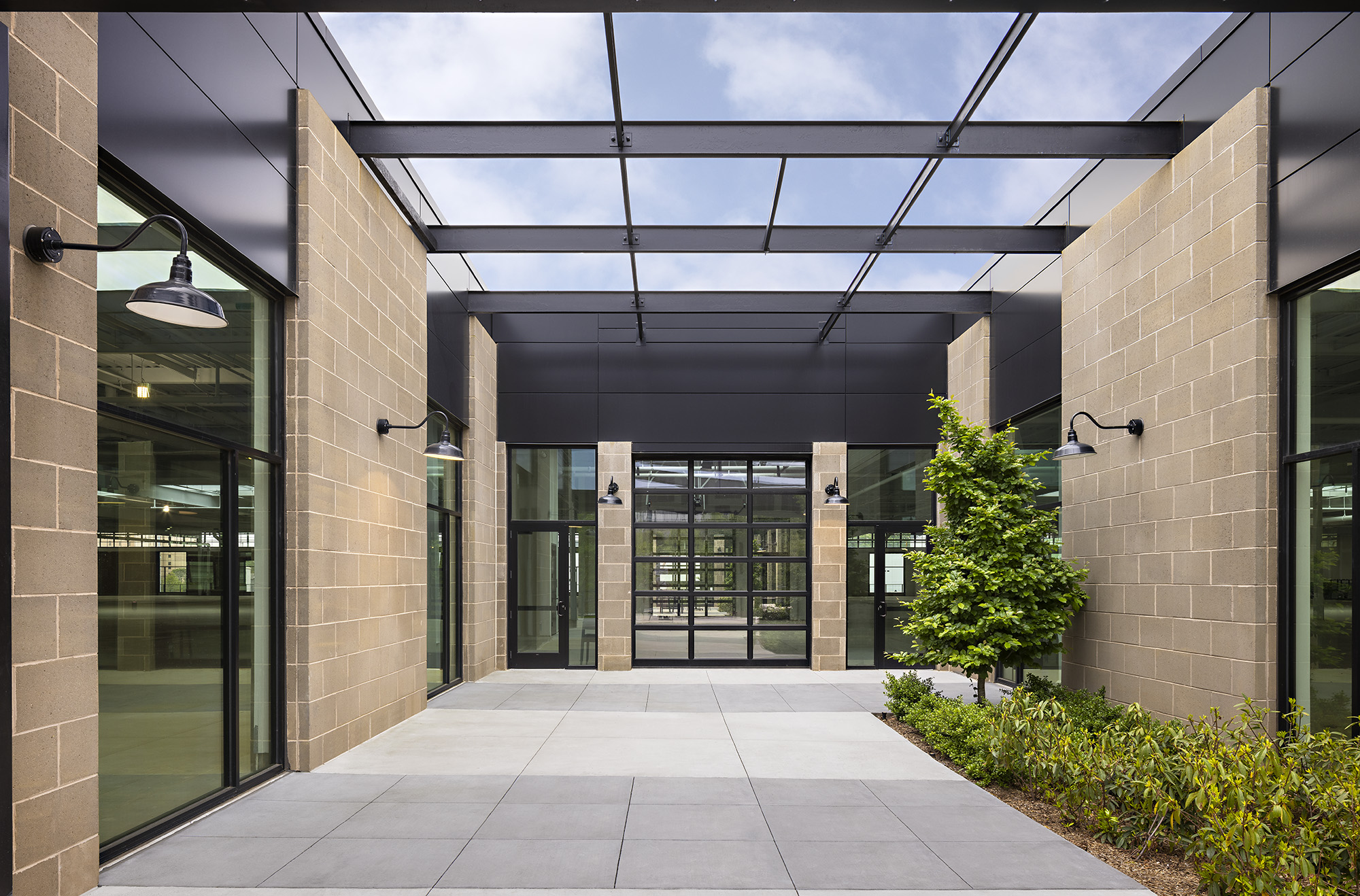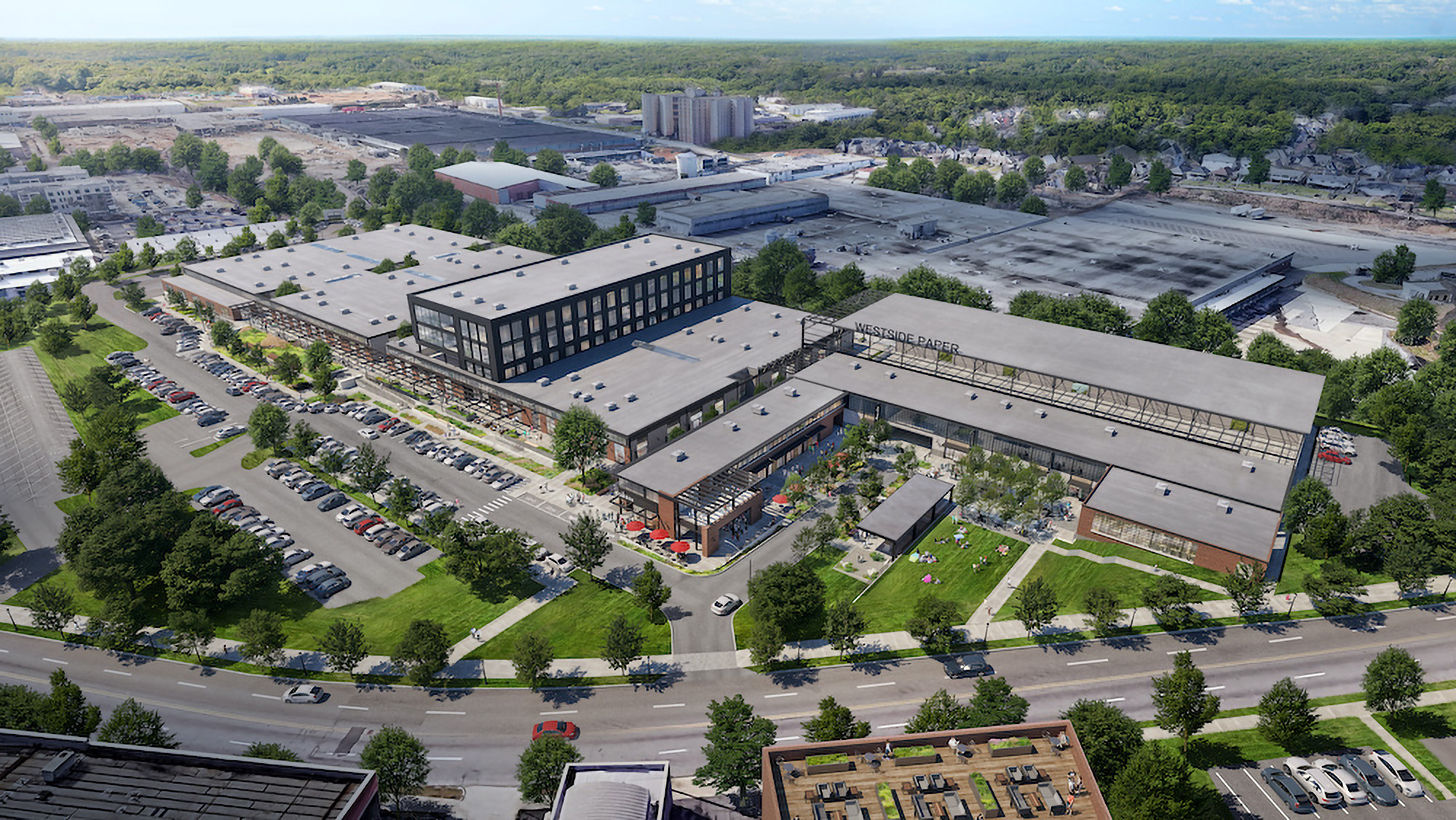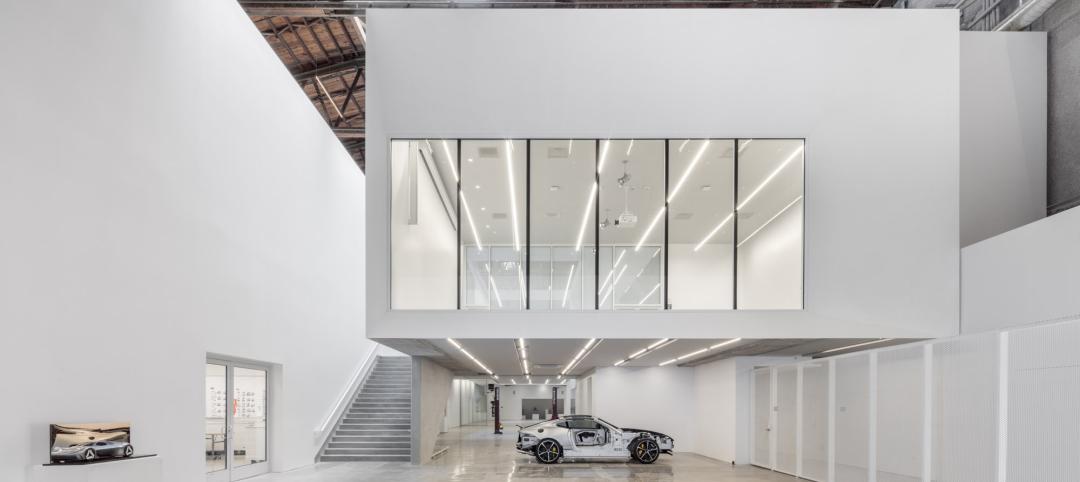An adaptive reuse project in Atlanta turned an obsolete Coca-Cola packaging warehouse into a vibrant mixed-use retail/restaurant/office complex. The 250,000-sf structure is located along a now defunct railroad line that forms the footprint for the city’s multi-phase Beltline pedestrian/bike path that will eventually loop around the city.
“With the Beltline Spur Trail planned for the abandoned railroad and other neighborhood transitions, the design goal became how to modernize the existing building while preserving its industrial history,” says Victoria Walsh, AIA, LEED AP, Architect, Perkins&Will. “Our big move was cutting up the warehouse into three separate parts. New promenades through the building allowed natural light, ventilation, and direct entry to the office and retail spaces.”
Westside Paper Mixed-Use Redevelopment

Contemporary elements were incorporated into the design to harmonize with the emerging Westside aesthetic. Echelon Masonry's Mondrian Stone provided a sleek, modern canvas for the darker steel elements and weathered brick walls.
The design preserved the steel armature framework overhead. Steel and glass clerestory windows were preserved and painted a dark bronze color that created a backdrop for the original masonry walls. “The light/dark contrast between the Mondrian Stone and painted bronze steel allowed for that clear delineation between old and new,” Walsh says.
The 15-acre location has already been leased by multiple vendors, with only a few spaces remaining.
“The neighborhood has rapidly changed with so much residential development moving in,” Walsh says. “Another adaptive reuse project King Plow—a former plow factory converted into a popular arts center, is just across the street.”

On the Building Team:
Owner and/or developer: FCP (Federal Capital Partners)
Design architect: Perkins&Will
Architect of record: Perkins&Will
MEP engineer: Barrett Woodyard
Structural engineer: Shear Structural
General contractor/construction manager: Gay Construction
Related Stories
Education Facilities | Aug 4, 2024
A former supersonic wind tunnel becomes a new educational facility for transportation design
The Mullin Transportation Design Center at ArtCenter College of Design in Pasadena, Calif., provides access for full-scale vehicular models, replicating a professional design studio.
Adaptive Reuse | Jul 30, 2024
Empty mall to be converted to UCLA Research Park
UCLA recently acquired a former mall that it will convert into the UCLA Research Park that will house the California Institute for Immunology and Immunotherapy at UCLA and the UCLA Center for Quantum Science and Engineering, as well as programs across other disciplines. The 700,000-sf property, formerly the Westside Pavilion shopping mall, is two miles from the university’s main Westwood campus. Google, which previously leased part of the property, helped enable and support UCLA’s acquisition.
Great Solutions | Jul 23, 2024
41 Great Solutions for architects, engineers, and contractors
AI ChatBots, ambient computing, floating MRIs, low-carbon cement, sunshine on demand, next-generation top-down construction. These and 35 other innovations make up our 2024 Great Solutions Report, which highlights fresh ideas and innovations from leading architecture, engineering, and construction firms.
Adaptive Reuse | Jul 12, 2024
Detroit’s Michigan Central Station, centerpiece of innovation hub, opens
The recently opened Michigan Central Station in Detroit is the centerpiece of a 30-acre technology and cultural hub that will include development of urban transportation solutions. The six-year adaptive reuse project of the 640,000 sf historic station, created by the same architect as New York’s Grand Central Station, is the latest sign of a reinvigorating Detroit.
MFPRO+ News | Jun 24, 2024
‘Yes in God’s Backyard’ movement could create more affordable housing
The so-called “Yes in God’s Backyard” (YIGBY) movement, where houses of worship convert their properties to housing, could help alleviate the serious housing crisis affecting many communities around the country.
Multifamily Housing | Jun 14, 2024
AEC inspections are the key to financially viable office to residential adaptive reuse projects
About a year ago our industry was abuzz with an idea that seemed like a one-shot miracle cure for both the shockingly high rate of office vacancies and the worsening housing shortage. The seemingly simple idea of converting empty office buildings to multifamily residential seemed like an easy and elegant solution. However, in the intervening months we’ve seen only a handful of these conversions, despite near universal enthusiasm for the concept.
Adaptive Reuse | Jun 13, 2024
4 ways to transform old buildings into modern assets
As cities grow, their office inventories remain largely stagnant. Yet despite changes to the market—including the impact of hybrid work—opportunities still exist. Enter: “Midlife Metamorphosis.”
Adaptive Reuse | Jun 6, 2024
Latest phase of London redevelopment completes two new buildings
Developers are creating a neighborhood for 25,000 residents and workers.
MFPRO+ News | Jun 3, 2024
New York’s office to residential conversion program draws interest from 64 owners
New York City’s Office Conversion Accelerator Program has been contacted by the owners of 64 commercial buildings interested in converting their properties to residential use.
Adaptive Reuse | May 15, 2024
Modular adaptive reuse of parking structure grants future flexibility
The shift away from excessive parking requirements aligns with a broader movement, encouraging development of more sustainable and affordable housing.

















